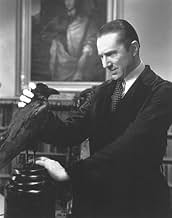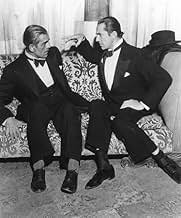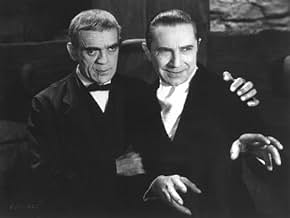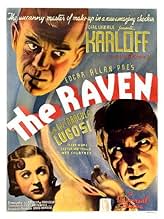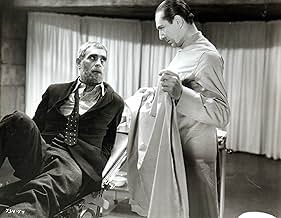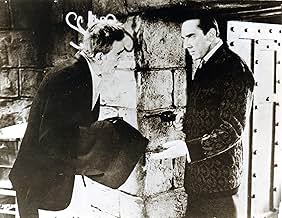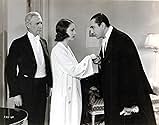VALUTAZIONE IMDb
6,8/10
7007
LA TUA VALUTAZIONE
Aggiungi una trama nella tua linguaA brilliant surgeon with a morbid obsession for instruments of torture grows dangerously obsessed with a young socialite whose life he's saved.A brilliant surgeon with a morbid obsession for instruments of torture grows dangerously obsessed with a young socialite whose life he's saved.A brilliant surgeon with a morbid obsession for instruments of torture grows dangerously obsessed with a young socialite whose life he's saved.
- Regia
- Sceneggiatura
- Star
Boris Karloff
- Edmond Bateman
- (as Karloff)
Bela Lugosi
- Dr. Richard Vollin
- (as Lugosi, Bela Lugosi)
Anne Darling
- Autograph Hound
- (scene tagliate)
June Gittelson
- Autograph Hound
- (scene tagliate)
Joe Haworth
- Drug Clerk
- (scene tagliate)
Mary Wallace
- Autograph Hound
- (scene tagliate)
Raine Bennett
- Actor reading 'The Raven'
- (non citato nei titoli originali)
Al Ferguson
- The Crook
- (non citato nei titoli originali)
Nina Golden
- Dancer
- (non citato nei titoli originali)
Jonathan Hale
- Bedside Dr. at Jerry's Right
- (non citato nei titoli originali)
Arthur Hoyt
- Chapman - Buyer of Poe Memorabilia
- (non citato nei titoli originali)
Recensioni in evidenza
This solid little horror feature offers Bela Lugosi and Boris Karloff together again, plus an interesting (if completely implausible) story. There are a fair number of Edgar Allan Poe references, but no real connections - none of the material bears any real resemblance to Poe, and the references are meant to be atmospheric at the most.
Lugosi's role in this one is much larger than Karloff's, and Bela carries most of the story. His theatrical style is quite appropriate in the role of Dr. Vollin, making for an entertaining yet genuinely dangerous foe. When Lugosi is in good form, he can make the most ridiculous dialogue come out right. Both the story and dialogue here would indeed collapse under the most basic logical analysis, and Lugosi's showmanship is one of the reasons why much of it works anyway.
While Karloff has a smaller role, he also does a good job, and indeed the movie would not have worked very well without Karloff's efforts in making Bateman pathetic and unheroic, yet human and understandable. The rest of the cast have fewer opportunities, yet the roles are filled by good character players who all do their jobs well.
The consensus, namely that "The Raven" is a cut below the previous year's Boris/Bela collaboration "The Black Cat", seems accurate. Yet "The Raven" in itself is a solid and usually entertaining feature.
Lugosi's role in this one is much larger than Karloff's, and Bela carries most of the story. His theatrical style is quite appropriate in the role of Dr. Vollin, making for an entertaining yet genuinely dangerous foe. When Lugosi is in good form, he can make the most ridiculous dialogue come out right. Both the story and dialogue here would indeed collapse under the most basic logical analysis, and Lugosi's showmanship is one of the reasons why much of it works anyway.
While Karloff has a smaller role, he also does a good job, and indeed the movie would not have worked very well without Karloff's efforts in making Bateman pathetic and unheroic, yet human and understandable. The rest of the cast have fewer opportunities, yet the roles are filled by good character players who all do their jobs well.
The consensus, namely that "The Raven" is a cut below the previous year's Boris/Bela collaboration "The Black Cat", seems accurate. Yet "The Raven" in itself is a solid and usually entertaining feature.
BELA LUGOSI never had a role that made better use of his stylized ham emoting than his mad surgeon here. The camera holds him in close-ups that emphasize the penetrating gaze and knitted eyebrows as he obsesses about an attractive woman he wishes to marry.
He steals every scene he's in with his heavy emphasis on certain words and his inflection that has menace in every syllable. By comparison, Boris Karloff (top-billed) has a cameo role that he plays with his usual skill, managing to get some sympathy for a basically unsympathetic character--a man who served time as a killer. Between the two of them, they create a minor thriller that is the kind of horror film Universal was famous for in the '30s.
Lugosi being a man obsessed by Edgar Allen Poe's torture devices in stories like 'The Pit and the Pendulum', approaches every scene with relish, obviously delighted with his role as a surgeon who declares: "I love torture!" The plot, of course, is outrageously preposterous but just try to turn away as he puts into place his plan for the girl, her father and her fiance--as well as his servant Karloff.
None of it is believable, but it's all great fun in the tradition of Universal thrillers. Perfect for Halloween!!
He steals every scene he's in with his heavy emphasis on certain words and his inflection that has menace in every syllable. By comparison, Boris Karloff (top-billed) has a cameo role that he plays with his usual skill, managing to get some sympathy for a basically unsympathetic character--a man who served time as a killer. Between the two of them, they create a minor thriller that is the kind of horror film Universal was famous for in the '30s.
Lugosi being a man obsessed by Edgar Allen Poe's torture devices in stories like 'The Pit and the Pendulum', approaches every scene with relish, obviously delighted with his role as a surgeon who declares: "I love torture!" The plot, of course, is outrageously preposterous but just try to turn away as he puts into place his plan for the girl, her father and her fiance--as well as his servant Karloff.
None of it is believable, but it's all great fun in the tradition of Universal thrillers. Perfect for Halloween!!
The Raven casts Bela Lugosi as a doctor who has retired into research into the medical field and into the writings of Edgar Allan Poe. Bela has painstakingly recreated the torture devices that Poe had written about in his stories and has decided it's time for some live experimentation.
What has brought that about was Judge Samuel S. Hinds who has begged and persuaded Bela Lugosi to come out of research and do a delicate bit of neurosurgery to save daughter Irene Ware's life. Not only does he save her life, but she's back and better than ever at her modern dance gig.
Irene Ware was a beautiful girl, in real life a beauty contest winner. No wonder Dr. Lugosi starts confusing her with the famous Lenore in Poe's The Raven. But she doesn't want anything to do with him. Never mind that, Lugosi invites several people over including Hinds and Ware and he's going to settle accounts with all of them Edgar Allan Poe style.
To help him Lugosi has Boris Karloff who is a criminal on the run who has been made truly hideous by some of Bela's surgery. Bela keeps Boris on a short lease saying he'll fix him if he'll aid and abet his mad scheme.
The Raven is strictly an actor's vehicle and if it weren't for the presence of those masters of Gothic horror Boris Karloff and Bela Lugosi in the cast, this film would not fly. But with them leading the cast The Raven moves up a few notches in ratings. The two of them work hard to sell this film and they succeed admirably.
Bela and Boris, Forevermore.
What has brought that about was Judge Samuel S. Hinds who has begged and persuaded Bela Lugosi to come out of research and do a delicate bit of neurosurgery to save daughter Irene Ware's life. Not only does he save her life, but she's back and better than ever at her modern dance gig.
Irene Ware was a beautiful girl, in real life a beauty contest winner. No wonder Dr. Lugosi starts confusing her with the famous Lenore in Poe's The Raven. But she doesn't want anything to do with him. Never mind that, Lugosi invites several people over including Hinds and Ware and he's going to settle accounts with all of them Edgar Allan Poe style.
To help him Lugosi has Boris Karloff who is a criminal on the run who has been made truly hideous by some of Bela's surgery. Bela keeps Boris on a short lease saying he'll fix him if he'll aid and abet his mad scheme.
The Raven is strictly an actor's vehicle and if it weren't for the presence of those masters of Gothic horror Boris Karloff and Bela Lugosi in the cast, this film would not fly. But with them leading the cast The Raven moves up a few notches in ratings. The two of them work hard to sell this film and they succeed admirably.
Bela and Boris, Forevermore.
This is the Boris & Bela show all the way. Like its sort-of companion piece "The Black Cat," THE RAVEN involves young lovers held captive by a madman with an odd hobby, in a large house which is elaborately tricked-out with amenities not usually found in even the most exclusive residences. This time out, Boris is the nominal "hero" (as with "The Black Cat," the male half of the young couple proves remarkably useless) and Bela the nut-case: Richard Vollin; doctor, Poe aficionado and do-it-yourself-er without peer. Summoned from retirement to perform life-saving surgery on Jean Thatcher, a lovely young dancer, he subsequently falls head-over-heels for her, and the trouble starts.
Lugosi was a better actor than he usually gets credit for being; his downfall seemed to stem from a lack of selectivity about what projects he accepted, frequently landing him in dreck. THE RAVEN gives him ample opportunities to shine, and he makes the most of them. Some consider his work here over-the-top, but scenery-chewing is entirely appropriate to the character, who is written as an arrogant egomaniac - he refers to himself as "a law unto myself" and even "a god" - and probably the only out-and-out lunatic Lugosi ever played. The desires or welfare of others simply don't enter into the equation for Vollin. After repeated refusals to perform Jean's operation, only an appeal to his ego ("So, they DO say I am the only one!") can induce him; that the object of his affection makes no secret of her love for someone else is of no consequence to him, and for the one "nice" deed he does for someone else - making Jean's fiancé his research assistant - he flatters himself that he's being magnanimous, though his true motivation, keeping the young rival too busy to interfere with his pursuit of Jean, is nonetheless self-serving.
The gloriously unrestrained nature of his performance notwithstanding, he gives us some of his best moments here: when he finds himself in Karloff's clutches, totally helpless and at Boris' mercy, the panic beneath his thin veneer of casual bravado is palpable. Likewise the barely-controlled fury and pain when, ostensibly speaking about Poe, he tells of the madness that grips "a man of genius denied of his great love," and how that madness can drive him to conceive of "torture....torture for those who have tortured him." His perverse glee in inflicting that torture is chilling, and he even displays some unexpectedly dry wit. When Vollin demands of Jean's father, Judge Thatcher, "There are no two ways; send her to me," the Judge gasps an incredulous "Do you know what you're saying?" Lugosi, in a deliberate monotone, answers the question literally; repeating, "There - are - no - two - ways - send - her - to - me!"
If I've put the emphasis here on Lugosi, it's because he truly dominates all around him, including Karloff. That's no reflection on Boris; he just plays a mostly passive character: Edmond Bateman, bank robber and escaped con, who seeks Vollin out for an operation to make him "look different." Given the shady-looking hood who passes Vollin's name and address to Bateman, and the seedy surroundings in which the meeting takes place, one can't help but wonder at Vollin's social contacts, and the kind of services he's previously solicited (or performed). The unfortunate Bateman soon finds himself in over his head, the victim of Vollin's particularly sadistic blackmail.
As with Frankenstein's creation, Boris suffuses Bateman with pathos. "I don't want to do them things no more," he pleads, when Lugosi sets out to enlist his help for some dastardly deeds. Because of his predicament, we can feel sympathy for Bateman, even as he does more of "them things" at Vollin's behest. Under heavy and restricting makeup, as was often the case, Boris is able to communicate a great deal with his eyes (or, in this case, eye). Watch the excitement in them (it?) as Lugosi removes the post-op bandages; your heart fairly breaks because you know the shock that's in store for him.
The supporting cast is filled out with familiar and capable players such as Inez Courtney and Ian Wolfe (who has one of the film's best lines when, as Bela goes on his torture rampage, protests with an oh-so-civilized, "See here, Vollin, things like this can't be done!").
The ever-dependable and versatile Samuel S. Hinds provides us with one of his delightfully stodgy curmudgeons as Judge Thatcher, and he deserves a special nod on general principle. Hinds was one of those "oh, I've seen him a hundred times before" actors (whose face is probably known by far more people than his name) who, during the '30's and '40's, seemed to pop up in every third film released. His persona varied little (and he seemed doomed to rarely being cast as anything besides judge, doctor or lawyer), but he was able to bend it in whatever direction a role required, enabling him to move with ease from the tight-ass Thatcher to Slade, the corrupt, tobacco-spittin' judge in "Destry Rides Again," to the sage and kindly family physician in "The Boy With Green Hair." Too bad he never did a "Huck Finn;" he'd have been great as The King.
Despite the improbability (oh, all right; absurdity) of the plot, the script provides some wonderful dialogue. Hinds has the great good fortune of uttering the catchy phrase, "stark-staring mad" on more than one occasion. But the delivery of even the pithiest exchanges, such as "'You monster, you like to torture.' 'Yes, I like to torture.'" gives them a vitality far beyond what is on the page. When all is said and done, though, THE RAVEN is, above all, B & B's show. Each is at the top of his game, and together, they own it.
Lugosi was a better actor than he usually gets credit for being; his downfall seemed to stem from a lack of selectivity about what projects he accepted, frequently landing him in dreck. THE RAVEN gives him ample opportunities to shine, and he makes the most of them. Some consider his work here over-the-top, but scenery-chewing is entirely appropriate to the character, who is written as an arrogant egomaniac - he refers to himself as "a law unto myself" and even "a god" - and probably the only out-and-out lunatic Lugosi ever played. The desires or welfare of others simply don't enter into the equation for Vollin. After repeated refusals to perform Jean's operation, only an appeal to his ego ("So, they DO say I am the only one!") can induce him; that the object of his affection makes no secret of her love for someone else is of no consequence to him, and for the one "nice" deed he does for someone else - making Jean's fiancé his research assistant - he flatters himself that he's being magnanimous, though his true motivation, keeping the young rival too busy to interfere with his pursuit of Jean, is nonetheless self-serving.
The gloriously unrestrained nature of his performance notwithstanding, he gives us some of his best moments here: when he finds himself in Karloff's clutches, totally helpless and at Boris' mercy, the panic beneath his thin veneer of casual bravado is palpable. Likewise the barely-controlled fury and pain when, ostensibly speaking about Poe, he tells of the madness that grips "a man of genius denied of his great love," and how that madness can drive him to conceive of "torture....torture for those who have tortured him." His perverse glee in inflicting that torture is chilling, and he even displays some unexpectedly dry wit. When Vollin demands of Jean's father, Judge Thatcher, "There are no two ways; send her to me," the Judge gasps an incredulous "Do you know what you're saying?" Lugosi, in a deliberate monotone, answers the question literally; repeating, "There - are - no - two - ways - send - her - to - me!"
If I've put the emphasis here on Lugosi, it's because he truly dominates all around him, including Karloff. That's no reflection on Boris; he just plays a mostly passive character: Edmond Bateman, bank robber and escaped con, who seeks Vollin out for an operation to make him "look different." Given the shady-looking hood who passes Vollin's name and address to Bateman, and the seedy surroundings in which the meeting takes place, one can't help but wonder at Vollin's social contacts, and the kind of services he's previously solicited (or performed). The unfortunate Bateman soon finds himself in over his head, the victim of Vollin's particularly sadistic blackmail.
As with Frankenstein's creation, Boris suffuses Bateman with pathos. "I don't want to do them things no more," he pleads, when Lugosi sets out to enlist his help for some dastardly deeds. Because of his predicament, we can feel sympathy for Bateman, even as he does more of "them things" at Vollin's behest. Under heavy and restricting makeup, as was often the case, Boris is able to communicate a great deal with his eyes (or, in this case, eye). Watch the excitement in them (it?) as Lugosi removes the post-op bandages; your heart fairly breaks because you know the shock that's in store for him.
The supporting cast is filled out with familiar and capable players such as Inez Courtney and Ian Wolfe (who has one of the film's best lines when, as Bela goes on his torture rampage, protests with an oh-so-civilized, "See here, Vollin, things like this can't be done!").
The ever-dependable and versatile Samuel S. Hinds provides us with one of his delightfully stodgy curmudgeons as Judge Thatcher, and he deserves a special nod on general principle. Hinds was one of those "oh, I've seen him a hundred times before" actors (whose face is probably known by far more people than his name) who, during the '30's and '40's, seemed to pop up in every third film released. His persona varied little (and he seemed doomed to rarely being cast as anything besides judge, doctor or lawyer), but he was able to bend it in whatever direction a role required, enabling him to move with ease from the tight-ass Thatcher to Slade, the corrupt, tobacco-spittin' judge in "Destry Rides Again," to the sage and kindly family physician in "The Boy With Green Hair." Too bad he never did a "Huck Finn;" he'd have been great as The King.
Despite the improbability (oh, all right; absurdity) of the plot, the script provides some wonderful dialogue. Hinds has the great good fortune of uttering the catchy phrase, "stark-staring mad" on more than one occasion. But the delivery of even the pithiest exchanges, such as "'You monster, you like to torture.' 'Yes, I like to torture.'" gives them a vitality far beyond what is on the page. When all is said and done, though, THE RAVEN is, above all, B & B's show. Each is at the top of his game, and together, they own it.
Followers of horror melodrama will get a full evening's entertainment out of THE RAVEN... it has some hair-raising situations.. All that has been left of the famous...Poe poem is the title. A statuette of a raven, which Lugosi kept on his desk was the excuse for the use of the title. A situation that will give shudders is when Lugosi removes bandages from Karloff's face, which he had disfigured horribly. Director Friedlander has kept the pace at a nice pitch, stripping it down to its fundamentals and letting the shock troupers, Karloff and Lugosi do their worst. Universal's high batting average for year 1935 with the shockers, only this one looks the least costly of 'em, without any obvious cheating. However, this film is a classic and worth viewing if you are lovers of Lugosi and Karloff...
Lo sapevi?
- QuizAccording to Greg Mank's book "Karloff and Lugosi, Karloff received $10,000 for his work, Lugosi $5000, Irene Ware $625, Lester Matthews $1153.76, and Samuel S. Hinds $1333.35.
- BlooperAfter Dr. Vollin regales his house guests on the subject of Edgar Allan Poe, all rise to retire. Jean Thatcher stops, returns to her former place on the couch, and has to free her gown from the cushion. This action causes her to be the last guest to leave the room, allowing her to have a private moment with Bateman. In their subsequent two-shot, she apologizes to him for having been startled earlier when he'd entered the room where she was fixing her hair.
- Citazioni
Edmond Bateman: I'm saying, Doc, maybe because I look ugly... maybe if a man looks ugly, he does ugly things.
Dr. Richard Vollin: You are saying something profound.
- Curiosità sui creditiThe names of Spencer Charters and Ian Wolfe were accidentally reversed in the credits.
- ConnessioniFeatured in House of Horror: The Raven 1935 (1958)
- Colonne sonoreMusic
(uncredited)
from The Black Cat (1934)
Original Music and Classical Music Arrangements by Heinz Roemheld
Played as background music
I più visti
Accedi per valutare e creare un elenco di titoli salvati per ottenere consigli personalizzati
- How long is The Raven?Powered by Alexa
- What is 'The Raven' about?
- Is 'The Raven' based on Edgar Allen Poe's poem of the same name?
- Is Poe's 'The Raven' available to read online?
Dettagli
- Data di uscita
- Paese di origine
- Lingua
- Celebre anche come
- El cuervo
- Luoghi delle riprese
- Azienda produttrice
- Vedi altri crediti dell’azienda su IMDbPro
Botteghino
- Budget
- 115.000 USD (previsto)
- Tempo di esecuzione1 ora 1 minuto
- Colore
- Proporzioni
- 1.37 : 1
Contribuisci a questa pagina
Suggerisci una modifica o aggiungi i contenuti mancanti



